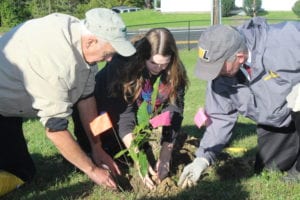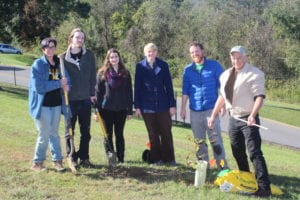WEST LIBERTY, W.Va., Oct. 18, 2018 — West Liberty University held a ceremonial tree planting at 10:30 a.m, Thursday, Oct. 18 to mark the return of American Chestnut Trees to the hilltop.
“It’s very exciting that we’re able to bring back a lost part of the region’s history and connect it to the future of the University and our students. I am grateful to the American Chestnut Foundation for making this tree planting possible,” said Dr. James Wood, a biology professor who is active in conservation. The trees are now located near the Elbin Library, behind Curtis and Bonar halls and adjacent to Route 88.

Special signs will be printed and placed at the tree area in the future that will include pictures and factual information on why the chestnut tree disappeared and the significance of its reappearance.
The three trees that WLU is planting are about 30-inches in height and will be mulched and supported to ensure a healthy growth. The chestnut blight has been called the greatest ecological disaster to strike the world’s forests in all of history, according to the ACF website.
“The new planting will educate people on the cultural and ecological history of the American Chestnut Tree. Prized for the edible nuts and high quality timber, Appalachian settlers depended on the tree in numerous ways,” said Robert Sypolt, representing the West Virginia chapter of the Chestnut Foundation, which is donating the trees.
The WLU maintenance department assisted by digging the holes and preparing the ground for the trees. Each tree also need approximately five foot of steel wire fence and four metal fence posts to keep the deer away from the trees.
Additional assistance was provided by the WLU Beautification Committee, chaired by Mary Ann Edwards, administrative secretary in the President’s Office.
“These trees can grow taller than oak and maple trees, to create a taller forest. They are white flowered trees and they made up such a large percentage of the forest that when they bloomed in the summer, they would make the hills look like they were covered with snow in the middle of summer,” Wood said.

It was formerly one of the most predominant trees in the forest from Maine to Mississippi. Currently, the West Virginia Chapter is replanting the trees and using it for land reclamation, after surface mining.
The American chestnut tree (Castanea dentata) is a large, monoecious deciduous tree of the beech family native to eastern North America. Before the species was devastated by the chestnut blight, a fungal disease, it was one of the most important forest trees throughout its range, and it was considered the finest chestnut tree in the world, according to the American Chestnut Foundation website (acf.org).
The American chestnut was an essential component of the eastern U.S. forest ecosystem. These giants stood up to 100 feet tall and numbered in the billions. As a late flowering, reliable, and extremely productive tree, the American chestnut was unaffected by seasonal frosts, making it the single most important food source for a wide variety of wildlife.
Rural communities depended upon the tree’s annual nut harvest as a cash crop to feed livestock. The chestnut lumber industry was a major sector of rural economies. Chestnut wood is straight-grained and easily worked, lightweight and highly rot-resistant, making it ideal for fence posts, railroad ties, barn beams and home construction, as well as for fine furniture and musical instruments.
At the beginning of the 20th century, the fungal pathogen responsible for chestnut blight was accidentally imported into the U.S. from Asia. It was first detected in New York in 1904, spreading rapidly throughout the eastern forests and by 1950, the fungus had eliminated the American chestnut as a mature forest tree.
For complete information on the American Chestnut Foundation, please visit the website, acf.org.
